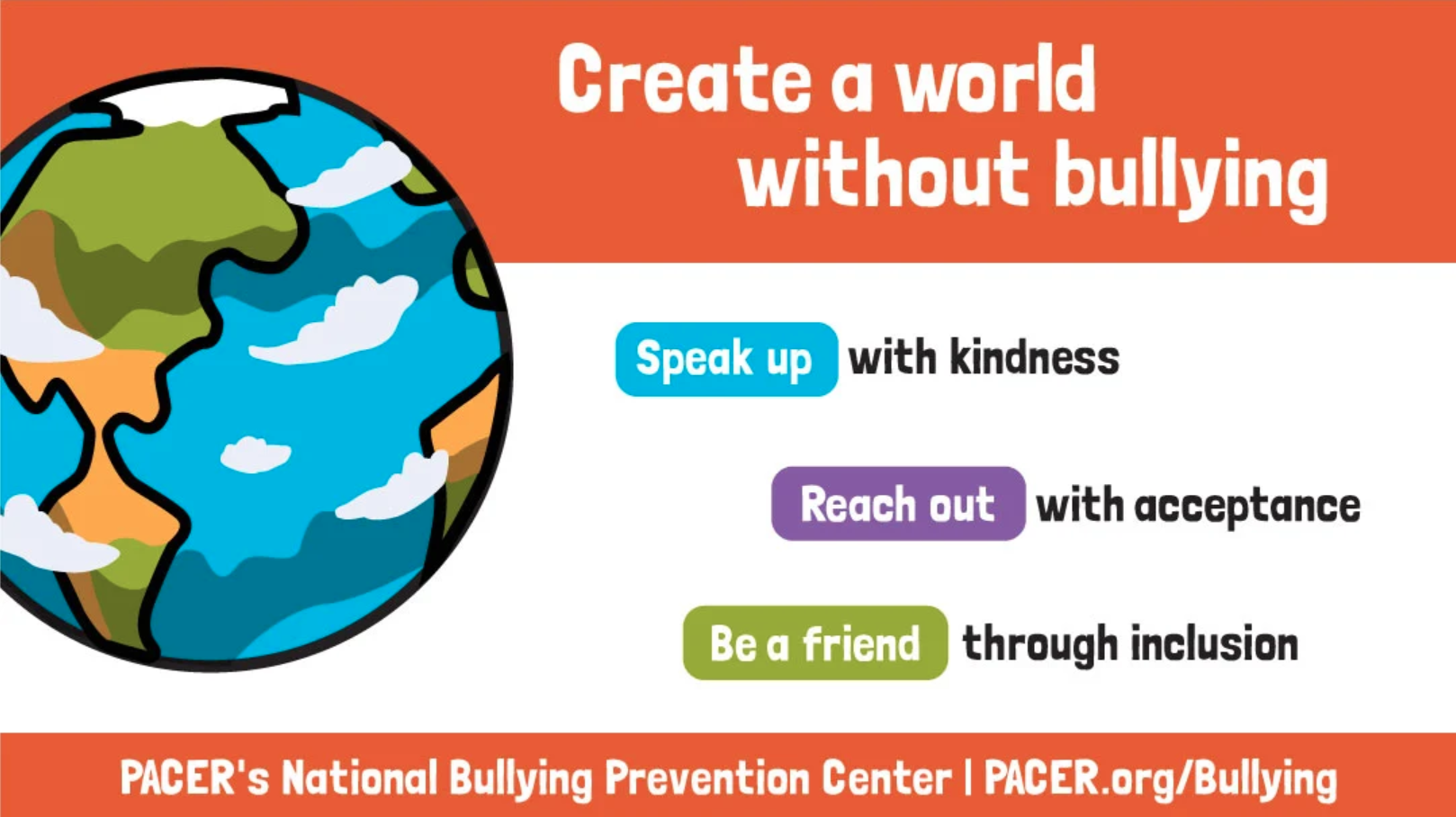Bullying Prevention Awareness

Thursday, Sep 24, 2020
INTRODUCTION
In recognition of National Bullying Prevention Awareness Month in October, the school counseling team will be working together to spread kindness and talk about unity school-wide. StopBullying.gov (2020), shares that “ parents, school staff, and other caring adults have a role to play in preventing bullying.” Talking openly about it and building a positive and safe school culture is important. In this month’s newsletter, you will find information regarding what bullying is, strategies for talking to your child about the topic, and how to best respond.
WHAT IS Bullying? What is IT not?
According to StopBullying.gov (2020), “Bullying is unwanted, aggressive behavior among school aged children that involves a real or perceived power imbalance. The behavior is repeated, or has the potential to be repeated, over time. Both kids who are bullied and who bully others may have serious, lasting problems.” There are various forms of bullying including verbal, social, physical and cyberbullying, all of which can have long-lasting impacts.
Misuse of the term can impact students’ learning the appropriate coping skills and conflict resolution skills necessary to successfully overcome minor conflicts. It is imperative for both adults and children to have the ability to distinguish between bullying from other hurtful, mean or harmful behaviors. These hurtful behaviors should always be addressed, but in order for it to be classified as bullying the following components must be present:
-
repeated harmful actions or threats,
-
a power imbalance and,
-
intention to cause harm
How will school counselors use SEL to address this topic at school?
Elementary:
At this age, children often don’t understand how to decipher between someone teasing or bullying them. As parents and educators, we want to provide children with the tools and skills necessary to effectively manage friendships and interpersonal conflicts. If we proactively teach children conflict resolution skills, self-advocacy skills, and prosocial behaviors, we work to prevent bullying behaviors from occurring.
This month for SEL, Ms. Abreu will provide a lesson on UNITY and teach students about the importance of inclusion and empathy. Students in K-2 will learn about ways to make others feel valued and accepted while understanding what the term bullying means. Students in 3-5 will learn about inclusion, acceptance, and valuing self and others.
Middle School:
At this age, children begin to understand the difference between bullying and teasing. Oftentimes, they need to be taught how to advocate for themselves and communicate. Parents play a major role in preventing and responding to bullying (StopBullying.gov, 2020). Knowing who your children’s friends are and finding ways to communicate with them is helpful in gaging what they might be experiencing and how to handle situations that may arise. Roleplay is a helpful way in addressing bullying with your child.
Through Ms. Montes’ lessons this month students will learn about diversity, acceptance, and unity. In this session they will be able to understand how some behaviors negatively impact others. They will also be able to begin exploring their own peer relationships and find ways to create positive and supportive ones with others. Students will also demonstrate empathy, identify some advocacy skills, and assert self when necessary.
High School:
At this age, parents and educators will likely notice students striving for autonomy. At times, they may be reluctant to talk about their peer relationships or admit if they are experiencing bullying. However, you can encourage your teen to talk by asking open ended questions.
-
What were the highs and lows of your school day?
-
Who are some of your closest friends? Who are some students you’d like to know better?
-
What are some things that are going well at school?
-
What are some things that aren’t going so well lately?
This month Dr. Renee will provide lessons focused on the importance of understanding how implicit bias and making assumptions about others based on appearance, behaviors, culture, etc., can have a negative impact. Our SEL lessons will allow students to explore ways to appreciate differences, develop empathy for others, and form respectful and meaningful relationships.
If you suspect your child is experiencing bullying, please encourage them to seek the support of the school counselor or other trusted adults. You can try/ask the following:
-
What is happening? When is this happening? Where is this happening? How often?
-
Have you told the person(s) to stop? Have you tried to walk away?
-
Have you told an adult at school such as a teacher or school counselor?
-
Inform School Staff - If based off of the information gathered from these questions, you suspect your child is a target of bullying, please contact your child’s school counselor or level administrator.
Bullying Prevention Inititiatives: October 2020October 5th - World Day of Bullying Prevention October 21st - Unity Day! Unite against bullying and display your Unity Day virtual background on Zoom. ***On October 21st, students can also wear orange accessories*** (accessories can include: socks, hair bows, pins, jewelry, laces, etc.). Students MUST remain in uniform |
Resources / References:
- https://www.pacer.org/bullying/nbpm/unity-day.asp
- https://www.stopbullying.gov
- StopBullying.Gov (2020). What is bullying?. U.S. Department of Health and Human Services. Retrieved from https://www.stopbullying.gov/what-is-bullying/index.html